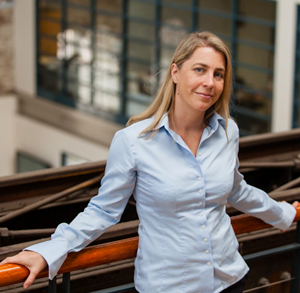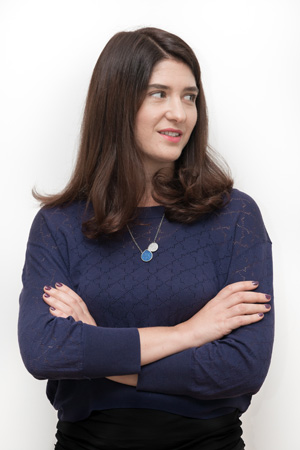At IMPACT7, on 1 August in Melbourne, researchers will present how their projects are helping to solve 7 major challenges. In one day, Australia’s most exciting science will be on display. Innovators will have three minutes to present their projects to Impact Leaders, who will provide feedback and guidance.
The organisers of IMPACT7 kindly provided the following interviews for EMCR Pathways. Congratulations to the winners of our IMPACT7 competition earlier this month. We are happy to give four EMCRs free registration to attend IMPACT7. If you would like to register to attend IMPACT7 use this promo code for a discount: i7-EMCR10

CEO, Cicada Innovations
@PetraAndren @CicadaInnov
You head up Cicada and have seen over 100 researchers commercialise their ideas. What is your advice for an early-career researcher who, in the back of their mind, thinks that one day that might be part of their journey?
My advice to anyone wishing to transition from research to industry would be to make a concerted effort towards engaging with the deep technology community of startups and scale ups. There are plenty of events and workshops on offer that make it easy to engage and learn more about the world of entrepreneurship and how it interacts with science-based innovation. The startup journey is not for everyone, and not everyone is suited to become the founder of an IP-driven company. However, the startup journey can take many forms, and the best way to learn more about it and find your own fit, is to expose yourself to it.
What is it that you love about the deep science and tech being developed in Australia?
The driving force behind our ground-breaking technologies is our world-leading research, with Australia being home to some world-leading universities and research institutions.
Unfortunately, Australia also ranks last in the OECD for commercialising this research. But this actually represents a massive opportunity for those who understand how to tap into these institutions and provide vehicles for commercialisation—which is exactly what we are about at Cicada innovations.
Owned by four of Australia’s biggest universities [University of Technology Sydney, University of Sydney, University of New South Wales and Australian National University], we’re the only business incubator in Australia to have direct access to their research and insights. This allows us to identify where the next waves of innovation are likely to occur—medtech, agtech, advanced manufacturing, AI, and robotics—and develop programs accordingly.
As an example, our Medical Device Commercialisation Training Program transitions academics into entrepreneurs. In just 18 months, we’ve graduated 32 medical technologists who’ve created nine companies that have collectively raised $15 million in public and private funding. The next cohort will be exposed to venture capitalists and angel investors with $1 billion funds under management over the next few weeks. We are now launching this program in the agtech space as a result of the great success we’ve had in the medtech space, and we can’t wait to see what amazing ideas we will be able to develop and take to market.
What is driving you to help early-stage scientists and technologists?
Early stage scientists and technologists are our future. Today, every company has become a technology company of sorts, as digital technologies are revamping virtually every business function and activity.
But some companies do more than apply digital technologies to existing functions or business models. Some companies are developing unique proprietary and hard-to-reproduce technological or scientific advances that have the power to truly disrupt existing markets, or create new markets entirely and shape the way we solve the most pressing global issues.
Why does research matter?
Without research, innovation simply cannot occur. This is why we need our universities and publicly funded research institutes to continue basic research aimed at improving scientific theories for enhanced understanding or prediction of natural or other phenomena.
Unfortunately, however, this highly important basic research is currently not prioritised in Australia. This problem is compounded by the fact that it is also the type of research that doesn’t get funded by the private sector, as the outcomes are fluid and not commercially focused.
The issue with this is that basic research is the very foundation on which applied research is built—it feeds the pipeline for the innovative products and services we consume. But despite this, today’s and tomorrow’s scientists are being encouraged to stay away from labouring on the unknown in the back labs of basic research. The money and the notoriety now tends to come from advancements championed through applied research, which is unfortunately an extremely short-sighted and limiting approach.
How can Australia address issues of gender parity and diversity in STEM?
The gender issue in STEM starts as early as primary school. Young girls are rarely encouraged to pursue maths and science. In addition, there exists an unconscious bias that science and maths are typically ‘male’ fields while humanities and arts are primarily ‘female’ fields. These stereotypes can inhibit girls’ likelihood of cultivating an interest in maths and science.
Young women need to be encouraged to study STEM subjects and we need to show off more female role models to inspire the next generation and combat the stereotypes.
What solutions, innovations, and inventions are you hoping to see at IMPACT7? Which of the 7 ‘challenges’ are you most interested in?
I am excited about all 7 of the challenge areas covered by IMPACT7 so I don’t think I could choose! Because Cicada Innovations is an industry-agnostic deep tech incubator, we don’t care if an idea affects cleantech, agtech, medtech, robotics, or any other industry, so long as it advances scientific and technological frontiers within that space.
Can you share any advice for early- and mid-career researchers wishing to pursue a career in your area?
As mentioned earlier, the most important advice I could give researchers wishing to commercialise their work is to get amongst those already doing this—the deep technology startup ecosystem.
At Cicada Innovations we have regular events where researchers are able to mingle and chat with like-minded technologists who are making progress commercialising their world-leading research. Speaking first-hand with someone who has been there and done that can sometimes prove invaluable in assisting a researcher in deciding how they might go about taking their first steps towards transitioning from research to industry.

Director of Education, Monash University
@DrRowanBrookes @MonashGC
What do you love about creating science education for twenty-first century graduates?
Science education in Australian universities has been critiqued for not sufficiently developing employability skills. In addition, one of the fundamental challenges of science education today is to develop well-rounded graduates who are ready to solve challenges present in society, business and politics. At Monash University I’ve been leading the development of an Australian-first, disruptive science degree, Global Challenges, which specifically addresses these challenges. I’m privileged to work with an incredible team of educators who are dedicated to changing science education. It’s also amazing to guide game-changing students who are going to be the next generation of influencers. When scientists are equipped with the additional skills set of leadership, communication and knowledge of business, they can have enormous impact across a range of sectors and create positive social and economic benefits.
You have won the Telstra Business Women’s Award. How important is it that we celebrate and acknowledge achievements?
It’s very important to me that women are celebrated and acknowledged for their incredible achievements and contributions. Awards give female scientists the recognition they’ve not traditionally been given. You need just think about those female scientists who have been forgotten by history until recently, such as Ada Lovelace or Ruby Payne-Scott. Awards also help bring visibility to issues that are important to women that have frequently been overlooked in the STEM fields. For example, issues of workplaces having gender exclusive cultural norms.
I believe it is important that we each take responsibility in putting ourselves forward for opportunities and that we nominate other women when awards are open. By getting involved in this process, either as a nominator or an awardee, you join a supportive community of people who can create life-changing differences.
How can Australia address issues of gender parity and diversity in STEM?
We need to achieve gender parity across all areas of society, not just STEM. When we achieve parity, everybody will be free from the restrictive stereotypes that harm individuals and constrain innovation. Men equally need to be able to freely choose to stay at home, or undertake caring professions without stigma. We also need to reach a more nuanced understanding of the intersectionality of diversity, so that the conversation includes people of colour, our LBGTI community and other minority groups. [Ed. The theme for the EMCR Forum’s next conference Science Pathways 2018 will be diversity—stay tuned!]
The Women’s Manifesto by the Australian writer Anne Summers provides excellent recommendations that get to the heart of the systemic issues behind the lack of parity in society.
The tangible steps I’d like to see taken within the next two years by all public STEM institutes (schools, universities and research institutes) include:
What solutions, innovations, and inventions are you hoping to see at IMPACT7? Which of the 7 ‘challenges’ are you most interested in?
I’d like to see solutions that demonstrate the impact that science and business can have when they are seamlessly linked together. Coming from a background in ecology and conservation, I’m naturally interested in the ‘Resilient and Natural Environments’ challenge. We are facing enormous environmental issues and we need a broad range of innovations to manage and mitigate the myriad adverse effects we are experiencing.
Can you share any advice for early-mid career researchers wishing to pursue a career in your area?
My recipe for career success is: work hard, put yourself forward, develop a positive mindset, build relationships, collaborate, share knowledge, ask questions and don’t be afraid to make mistakes. Simple huh?
© 2026 Australian Academy of Science